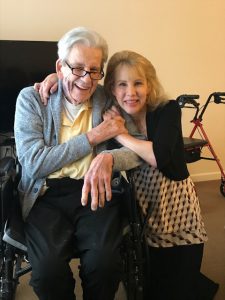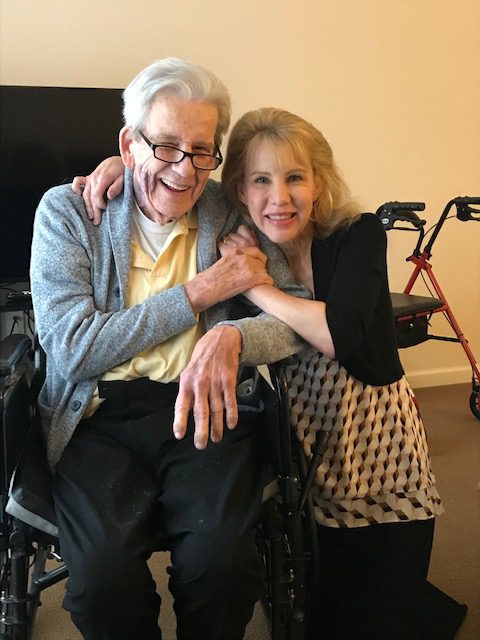Today I had a nice visit with my father. I brought him some fudge I made last night, which made him happy because he loves sweets. He was doing ok. We talked in his room for awhile and I read him some verses from the Bible, including Psalm 25. He was troubled about something so I thought this Psalm would comfort him.
My father is 87 and has Lewy Body dementia, which is a progressive neurocognitive disease similar to Alzheimer’s and Parkinson’s disease. He lives in a nearby memory care facility. 
I prayed with him before I left and he cried, but it was a good kind of cry. The cry of being touched by the Lord, of feeling his nearness and glory and knowing we aren’t alone. I felt my father’s salty tears as I kissed his cheek and the tremor in his voice as he thanked me.
They were playing music outside his room–old-timers’ music like Blueberry Hill and Dock of the Bay–so I wheeled him out there before I left. I kissed him again and told him I loved him and would be back later with a few list items. A staff member had left a note in his room saying “Mr. George” needed a laundry basket. I noticed he was also out of napkins, coffee creamer and mini Reese’s, his favorite. I cannot keep him in stock. Each time I visit, I find wrappers everywhere.
I’m in my car just a few blocks down the road when the Lord convicts me so powerfully I feel something break open inside me. It isn’t a rebuke but a loving, gentle correction. My heavenly Father has revealed something to me.
It means so much to him when you come by, but you haven’t been there much this week. You are just a few miles away. I know it’s it’s hard for you to go to that place, but this isn’t about you.
I am overcome: crying, driving and saying out loud, “It’s not about me. It’s not about me. It’s not about me.” Three times it came out of my mouth without my even realizing it.
My mind flashes back to the troubled look on my father’s face just a few minutes ago when he described the problems he was having on his “team.” Staff leaders divide the residents into groups for exercises and problem-solving activities. Haltingly as he struggled to voice the words, my dad said he didn’t understand some of the “… you know…” And he didn’t know how to tell the team leader. I think it was because he felt ashamed.
“It’s ok, Dad.” I said. “I understand why you want to do well, but you don’t have to be perfect. Your illness will make some of these things hard for you to do. Just think of it as a hobby and try to have fun with it, ok?” He nodded but still looked worried.
Last week he was even more upset. When I arrived he was sitting at the table in the open area outside his room. Surrounding him were six or seven other residents in their 70s and 80s. No one was talking. A man was asleep in his chair, his head rolled back at an awkward angle. Next to him a woman cradled a baby doll wrapped in a blanket. The woman reminded me of my grandmother, who died from Alzheimer’s. I remember visiting her at the nursing home and seeing her holding the same type of baby doll.
My father doesn’t notice me until I touch his shoulder. I feel the sharpness of his bones protruding underneath his golf shirt. He is 40 pounds lighter than he was six months ago.
“Hi Dad,” I say as I lean over to kiss him. “How are you doing?”
“Not good,” he says. “I need…” He pauses, struggling to find the right words. “Tell you about this… thing. These people are on this team, and then there’s this hotshot on the other team…” he trails off while I wait, fighting the urge to fill in the gaps. I have no idea what he’s trying to say. Seconds of silence stretch out.
“Let’s go where we can talk, Dad.” I wheel him into his room, which is just behind the table. The nurse and I thought putting him out front would be good for him, because it would force him to socialize with the others. My father is very friendly but not outgoing. He usually needs someone else to make the first move.
I close the door and sit across from my father. “What is bothering you, Dad?”
“I told you! This hotshot! I don’t like him! I told him so too! He’s an ass!”
“Who is it? Do you know his name?” I ask.
“This guy on the other team!” My father is agitated. “This…. Hotdogger! You know! He thinks he’s… he doesn’t like me. He wants to get rid of me! “
“No one is going to get rid of you.” Even as I say the words, they sound hollow. “What makes you think he doesn’t like you?”
“I knew you wouldn’t believe me,” my dad says. He looks away, his face angry.
“I do believe you, Dad,” I say. I take his hand and he looks at me. “I’m just trying to figure out who you are talking about.”
“The other team! They have his new… deal… There are two teams and he’s on the one that is against me! They want to kick me out of here!”
It took me almost 20 minutes to understand what my father was trying to tell me. The LBD is slowly shrinking his brain. The word-retrieval function has been damaged. He can speak, but he often cannot remember the words he needs to complete his thought. Synapses fire but don’t connect, leaving words hanging in the air as my father sputters and grasps. Sometimes he will insert a word that makes no sense. Other times, he gives up. “Why can’t I talk anymore?” he asks me.
All this comes flooding back as I stop at a stoplight, sobbing now and probably looking crazy to the person in the car next to me. I’m less than a mile from the coffee shop, but I cannot wait. I pray right there and ask Jesus to forgive me. I am so selfish.
I know I have been forgiven, and I know I will be selfish again. I don’t want to, but it is my nature to think of myself first. I want to do what feels good. I want to avoid pain, which is why I drank for so many years. I told myself it was to relax, but it was really to run away.
Running was little Leener’s best method for self-protection. When things got dark, she ran to a soft, warm place. She was a slight child who didn’t take up much room, so she would curl up into a secret nook. Barely visible, yet protected and safe. And when she got older, the nook became a wine bottle.
But there is nowhere to run now. I don’t have alcohol anymore. There is no respite from the searing ache I feel watching my father slowly die. It is the most anguish I have ever felt. It is constant—a pulsating ball of bile lodged in my stomach. Its flames fan outward, burning away my insides. I am terrified it will destroy me.
And then the Lord wrests my fear away. He takes my hand and whispers in my ear, his breath a caress on my cheek. He reminds me what all this is about—who this is about.
It is not about me. It is Him. When I honor my earthly father, I glorify my heavenly Father.


Great read. ❤️❤️❤️ As I read your article, I feel like I am right there living it too. I will be praying for you and your father. He is so blessed to have you near by.
Miss out coffee time. ?
Absolutely beautiful the love in these words.
Heartbreaking and beautiful all at the same time.
Love,
Paula
This is really beautiful Aunt Lee. Miss and love you both!
Eileen – It’s great to hear from you! I loved reading this and it was a beautiful reminder to be of service to others. Your father is a lucky man and you are a wonderful daughter. Thanks for sharing. Love You! XOXO
Thank you Heather. Your note made my day. Miss you and hope you are well. Love, Eileen
Beautifully written; sad and joyful at same time. I know it is so hard for him and it is hard to understand what he is trying to say. You described it so eloquently.
Love, Georgia